
|
Archivos Latinoamericanos de Produccion Animal
Asociacion Latinoamericana de Produccion Animal
ISSN: 1022-1301
EISSN: 1022-1301
Vol. 15, No. 1, 2007, pp. 32-37
|
 Bioline Code: la07005
Bioline Code: la07005
Full paper language: Spanish
Document type: Research Article
Document available free of charge
|
|
|
Archivos Latinoamericanos de Produccion Animal, Vol. 15, No. 1, 2007, pp. 32-37
| en |
Polymorphism in the μ-calpain gene of registered Brahman cattle from Mexico
Parra-Bracamonte, G.M.; Sifuentes-Rincón, A.M.; Cienfuegos-Rivas, E.G.; Tewolde- Medhin, A. & Martínez-González, J.C.
Abstract
The present study was conducted to assess genotypic, allelic and haplotypic frequencies, in Brahman cattle in Mexico, of three single nucleotide polymorphism markers in the m -calpain gene, previously associated with beef tenderness in European, crossbred, and Zebu cattle (C316, C530, C4751). Three allelic discrimination assays were designed for generation of the said frequencies. The C316 marker showed a high frequency of the heterozygotic genotype (CG = 92%), and frequencies of these alleles were similar (54 and 46% for G and C, respectively). By contrast, for C530, the main segregated genotype was the A alleles homozygote (98%). For C4751, the heterozygotic genotype (CT) had the highest frequency (99%). As to haplotypes, the most frequent compositions were GAT (50%) and CAC (45%). These findings suggest that some favorable alleles for beef tenderness (C in 316 and C4751) are appreciably segregated in the Brahman population sampled. Thus, favorable homozygotic genotypes might be increased by integrated selection programs, including either the single marker or dual marker haplotype evaluation. Further research is needed to determine relationships between meat quality traits (beef tenderness) and productive performance (current selection criteria), thus to promote consumption of Brahman beef and better position it in both national and international markets.
|
| |
| es |
Polimorfismo en el gen de la μ-calpaína en ganado Brahman de registro de México
Parra-Bracamonte, G.M.; Sifuentes-Rincón, A.M.; Cienfuegos-Rivas, E.G.; Tewolde- Medhin, A. & Martínez-González, J.C.
Resumen
Se diseñó un estudio en ganado Brahman de México, para caracterizar las frecuencias de tres polimorfismos de un solo nucleótido en el gen de la μ-calpaína (C316, C530, C4751), que previamente se han asociado con suavidad de la carne en razas europeas, cruces y en ganado Cebú. Se realizaron tres ensayos de discriminación alélica para generar frecuencias genotípicas, alélicas y haplotípicas. El marcador C316 mostró la mayor frecuencia en el genotipo heterocigoto (CG = 92%), por lo que las frecuencias de sus alelos fueron similares (54 y 46% para G y C, respectivamente). En contraste, para C530, la mayor frecuencia fue para el genotipo homocigoto con la variante alélica A (98%). Finalmente, para el C4751 el genotipo más frecuente fue el heterocigoto (CT) con 99%. Los haplotipos GAT y CAC (50 y 45%, respectivamente) obtuvieron la mayor frecuencia. Los resultados indican que copias alélicas favorables para suavidad de la carne (C en C316 y C4751) son segregados de manera importante en la población Brahman. Esto sugiere que un manejo asistido de los hatos puede incrementar la frecuencia de genotipos homocigotos favorables para la suavidad de la carne en la población Brahman. Es necesario realizar estudios que relacionen características de calidad (suavidad) y crecimiento (criterio actual de selección) para ayudar a estimular el mayor consumo de la carne de esta raza, brindándole mejor posición en el mercado nacional e internacional
Palabras-clave
Brahman, Calpaína, Alelos, Genotipos, Haplotipos, Suavidad de carne.
|
| |
© Copyright 2006 - ALPA. Arch. Latinoam. Prod. Anim.
Alternative site location: http://www.alpa.org.ve/ojs/index.php
|
|
